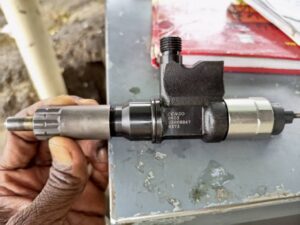Fuel injectors are critical components in a diesel engine’s performance. Most injector failures aren’t due to quality issues but result from inadequate maintenance, leading to deposits and gum buildup. Regular cleaning and maintenance are essential to prevent injector malfunctions and ensure optimal engine operation.
Common Issues Caused by Fuel Injector Failures
When fuel injectors fail, it can lead to various performance problems:
- Engine vibration and unstable RPM
- Difficulty starting, sluggish acceleration, and reduced power
- Increased fuel consumption and higher emissions
- Dilution of engine oil
Recognizable Fault Symptoms:
- Poor idle performance
- Difficulty accelerating
- Challenges in starting the engine
Primary Cause:
The main reason for injector failure is the lack of maintenance, which leads to gum and debris accumulating inside the injector.
Maintenance Guidelines for Fuel Injectors
Proper maintenance can significantly extend the lifespan of fuel injectors. Follow these precautions to prevent damage during repairs or replacements.
Key Maintenance Precautions
- Use Matching Injectors
Ensure the injector’s part number matches the original one to avoid compatibility issues. Substitutions should not be made. - Handle O-Rings Properly
Apply non-silicone clean engine oil to the O-ring during installation to facilitate fitting. Ensure no oil enters the nozzle or injector interior. Always replace the O-ring when reinstalling. - Prevent Damage During Installation
- Avoid disassembling or cleaning the filter mesh without professional guidance.
- If the injector has two grooves, carefully align the clips according to the original setup.
- Clean the injector seat to prevent foreign objects from entering the cylinder.
Diagnosing Fuel Injector Issues
Simple Resistance Test for Fuel Injectors
Using a digital multimeter:
- Disconnect the connector from the injector.
- Set the multimeter to measure resistance (ohms).
- Connect the probes to the injector pins. The resistance at 20°C should range between 11-17 ohms.
Common Injector Failures
Mechanical Failures:
- Sticking or blockage
- Leaks
Electrical Circuit Failures:
- Open or short circuit in the electromagnetic coil
Cleaning and Maintaining the Fuel Tank
Fuel tanks often accumulate impurities over time, impacting fuel injectors and overall engine performance. Regular cleaning can mitigate these issues.
Initial Inspection
- Examine the fuel tank exterior for dents, leaks, or loose bolts. Repair any damage before proceeding.
Fuel Tank Cleaning Procedure
- Remove the filter screen from the tank opening.
- Siphon out most of the fuel, leaving about 30 liters inside.
- Insert a clean compressed air hose into the tank and apply air pressure of 2-3 kg/cm² to agitate and clean the remaining fuel.
Maintaining Reliable Fuel Injector Performance
Regular care of fuel injectors and the fuel system can prevent most performance issues. Key recommendations include:
- Cleaning the fuel injectors at regular intervals, not only when problems arise.
- Using high-quality diesel fuel to reduce impurities.
- Replacing filters and O-rings as part of routine maintenance.
By adhering to these best practices, you can enhance engine performance, reduce repair costs, and extend the life of your injectors and overall fuel system.
Choosing the Right Fuel Injectors for Reliable Performance
Regular maintenance is essential to keep your diesel engine in top condition. When it’s time to replace fuel injectors, choosing reliable, high-quality options makes all the difference.
We provide a comprehensive range of fuel injectors and spare parts compatible with leading brands like BOSCH, DENSO, DELPHI, CAT, SIEMENS, CUMMINS, SCANIA and VOLVO. All our products are precision-engineered, rigorously tested, and come with a 12-month warranty for your peace of mind.
If you’re facing injector issues or searching for dependable replacements, we’re here to help. Visit our website at https://dieselstart.com/product/ to explore our full product range and find the perfect fit for your needs.

